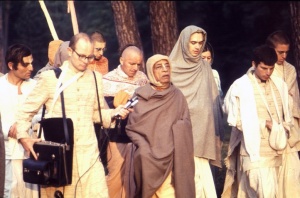SB 11.17.11: Difference between revisions
m (1 revision(s)) |
No edit summary |
||
| Line 1: | Line 1: | ||
{{info | {{info | ||
|speaker=Lord | |speaker=Lord Kṛṣṇa the Supreme Personality of Godhead | ||
|listener=Uddhava | |listener=Uddhava | ||
}} | }} | ||
[[Category:Srimad-Bhagavatam - Canto 11 Chapter 17]] | |||
[[Category:Bhagavatam Verses Spoken by Lord Krsna - Vanisource|111711]] | |||
<div style="float:left">'''[[Srimad-Bhagavatam]] - [[SB 11|Eleventh Canto]] - [[SB 11.17: Lord Krsna's Description of the Varnasrama System|Chapter 17: Lord Kṛṣṇa's Description of the Varṇāśrama System]]'''</div> | |||
<div style="float:right">[[File:Go-previous.png|link=SB 11.17.10]] '''[[SB 11.17.10]] - [[SB 11.17.12]]''' [[File:Go-next.png|link=SB 11.17.12]]</div> | |||
{{RandomImage}} | |||
{{SBnotice}} | |||
==== TEXT 11 ==== | ==== TEXT 11 ==== | ||
<div | <div class="verse"> | ||
vedaḥ praṇava evāgre | :vedaḥ praṇava evāgre | ||
dharmo 'haṁ vṛṣa-rūpa-dhṛk | :dharmo 'haṁ vṛṣa-rūpa-dhṛk | ||
upāsate tapo-niṣṭhā | :upāsate tapo-niṣṭhā | ||
haṁsaṁ māṁ mukta-kilbiṣāḥ | :haṁsaṁ māṁ mukta-kilbiṣāḥ | ||
</div> | </div> | ||
| Line 17: | Line 22: | ||
==== SYNONYMS ==== | ==== SYNONYMS ==== | ||
<div | <div class="synonyms"> | ||
vedaḥ—the Veda; | vedaḥ—the Veda; praṇavaḥ—the sacred syllable oṁ; eva—indeed; agre—in Satya-yuga; dharmaḥ—the object of mental activities; aham—I; vṛṣa-rūpa-dhṛk—bearing the form of the bull of religion; upāsate—they worship; tapaḥ-niṣṭhāḥ—fixed in austerity; haṁsam—Lord Haṁsa; mām—Me; mukta—freed from; kilbiṣāḥ—all sins. | ||
</div> | </div> | ||
{{SBcollapse}} | |||
==== TRANSLATION ==== | ==== TRANSLATION ==== | ||
<div | <div class="translation"> | ||
In Satya-yuga the undivided Veda is expressed by the syllable oṁ, and I am the only object of mental activities. I become manifest as the four-legged bull of religion, and thus the inhabitants of Satya-yuga, fixed in austerity and free from all sins, worship Me as Lord Haṁsa. | In Satya-yuga the undivided Veda is expressed by the syllable oṁ, and I am the only object of mental activities. I become manifest as the four-legged bull of religion, and thus the inhabitants of Satya-yuga, fixed in austerity and free from all sins, worship Me as Lord Haṁsa. | ||
</div> | </div> | ||
| Line 31: | Line 36: | ||
==== PURPORT ==== | ==== PURPORT ==== | ||
<div | <div class="purport"> | ||
The bull of religion is described in Śrīmad-Bhāgavatam ([[SB 1.17.24]]): tapaḥ śaucam dayā satyam iti pādāḥ kṛte kṛtāḥ. "In the age of Satya [truthfulness], your four legs were established by the four principles of austerity, cleanliness, mercy and truthfulness." Śrī Vyāsadeva divided the one Veda into four—the Ṛg, Yajur, Sāma and Atharva | The bull of religion is described in [[Srimad-Bhagavatam|''Śrīmad-Bhāgavatam'']] ([[SB 1.17.24]]): ''tapaḥ śaucam dayā satyam iti pādāḥ kṛte kṛtāḥ''. "In the age of Satya [truthfulness], your four legs were established by the four principles of austerity, cleanliness, mercy and truthfulness." Śrī Vyāsadeva divided the one ''Veda'' into four—the ''Ṛg, Yajur, Sāma'' and ''Atharva Vedas''—at the end of Dvāpara-yuga, but in Satya-yuga the whole of Vedic knowledge is easily understood by everyone simply by vibrating the syllable ''oṁ''. In this age there are no ritualistic or pious activities such as sacrifice, since everyone is sinless, austere and fully engaged in worshiping the Personality of Godhead, Lord Haṁsa, through the process of meditation. | ||
</div> | </div> | ||
__NOTOC__ | </div> | ||
</div> | |||
<div style="float:right">[[File:Go-previous.png|link=SB 11.17.10]] '''[[SB 11.17.10]] - [[SB 11.17.12]]''' [[File:Go-next.png|link=SB 11.17.12]]</div> | |||
__NOTOC__ | |||
__NOEDITSECTION__ | |||
Revision as of 16:24, 30 June 2021

A.C. Bhaktivedanta Swami Prabhupada
Please note: The synonyms, translation and purport of this verse were composed by disciples of Śrīla Prabhupāda
TEXT 11
- vedaḥ praṇava evāgre
- dharmo 'haṁ vṛṣa-rūpa-dhṛk
- upāsate tapo-niṣṭhā
- haṁsaṁ māṁ mukta-kilbiṣāḥ
SYNONYMS
vedaḥ—the Veda; praṇavaḥ—the sacred syllable oṁ; eva—indeed; agre—in Satya-yuga; dharmaḥ—the object of mental activities; aham—I; vṛṣa-rūpa-dhṛk—bearing the form of the bull of religion; upāsate—they worship; tapaḥ-niṣṭhāḥ—fixed in austerity; haṁsam—Lord Haṁsa; mām—Me; mukta—freed from; kilbiṣāḥ—all sins.
Translation and purport composed by disciples of Śrīla Prabhupāda
TRANSLATION
In Satya-yuga the undivided Veda is expressed by the syllable oṁ, and I am the only object of mental activities. I become manifest as the four-legged bull of religion, and thus the inhabitants of Satya-yuga, fixed in austerity and free from all sins, worship Me as Lord Haṁsa.
PURPORT
The bull of religion is described in Śrīmad-Bhāgavatam (SB 1.17.24): tapaḥ śaucam dayā satyam iti pādāḥ kṛte kṛtāḥ. "In the age of Satya [truthfulness], your four legs were established by the four principles of austerity, cleanliness, mercy and truthfulness." Śrī Vyāsadeva divided the one Veda into four—the Ṛg, Yajur, Sāma and Atharva Vedas—at the end of Dvāpara-yuga, but in Satya-yuga the whole of Vedic knowledge is easily understood by everyone simply by vibrating the syllable oṁ. In this age there are no ritualistic or pious activities such as sacrifice, since everyone is sinless, austere and fully engaged in worshiping the Personality of Godhead, Lord Haṁsa, through the process of meditation.